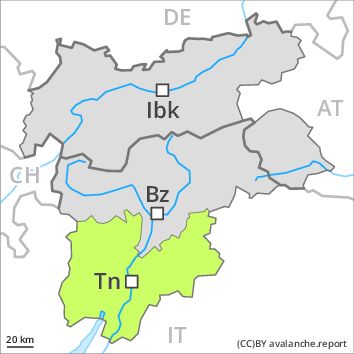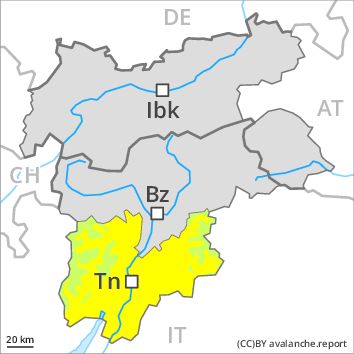Regions
Latemar, Southern Adamello, Primiero - Pale di S. Martino, Adamello - Presanella, Prealps, Northern Brenta - Peller, Cembra Valley, Bondone and Stivo, Vallarsa, Western Nonsberg Alps, Folgaria - Laverone, Southern Brenta, Fassa Valley, Sole, Pejo and Rabbi, Southern Lagorai, Ledro Valley, Northern Lagorai, Maddalene, Paganella, Marzola - Valsugana, Pine' - Mocheni Valley
AM
Danger level
Avalanche Problem
Favourable situation above 2400m
PM
Danger level
Avalanche Problem
Wet snow above 2800m, N-NE-E-SE-S-SW-W-NW
Gliding snow above 2800m, E-SE-S-SW-W
Natural wet avalanches in the afternoon.
The Avalanche Warning Service currently has only a small amount of information that has been collected in the field.
As a consequence of warming during the day and the solar radiation, the likelihood of moist and wet avalanches being released will increase gradually. As the day progresses small and, in isolated cases, medium-sized moist and wet avalanches are possible below approximately 2800 m. This also applies in isolated cases on very steep shady slopes as well as adjacent to ridgelines and in pass areas at high altitudes and in high Alpine regions.
From origins in starting zones where no previous releases have taken place moist and wet avalanches are possible, even quite large ones. Exposed parts of transportation routes can be endangered occasionally in the regions with a lot of snow.
Snowpack
dp 10: springtime scenario
dp 2: gliding snow
Outgoing longwave radiation during the night will be good. The surface of the snowpack will freeze to form a strong crust and will soften during the day.
Isolated avalanche prone weak layers exist in the old snowpack especially on very steep shady slopes.
On south and southwest facing slopes thus far only a little snow is lying below approximately 2000 m. At low altitude no snow is lying.
Tendency
The weather will be mild. Increase in danger of wet and gliding avalanches as a consequence of warming during the day and solar radiation.